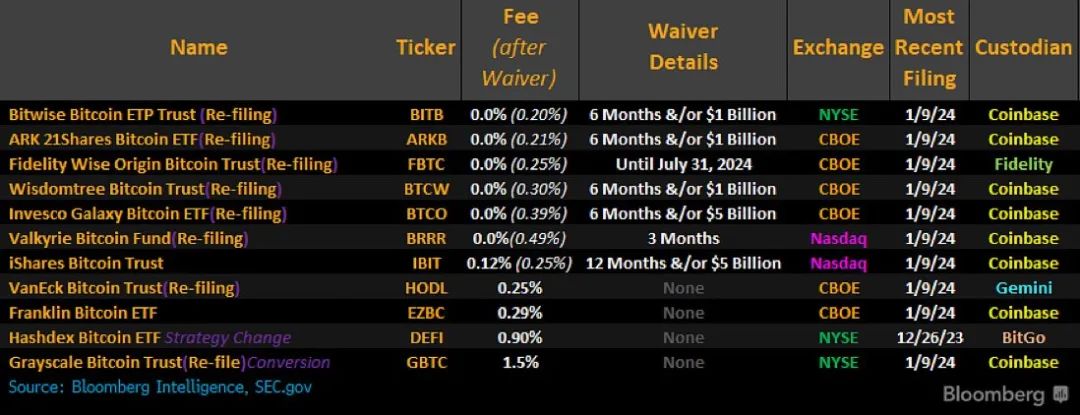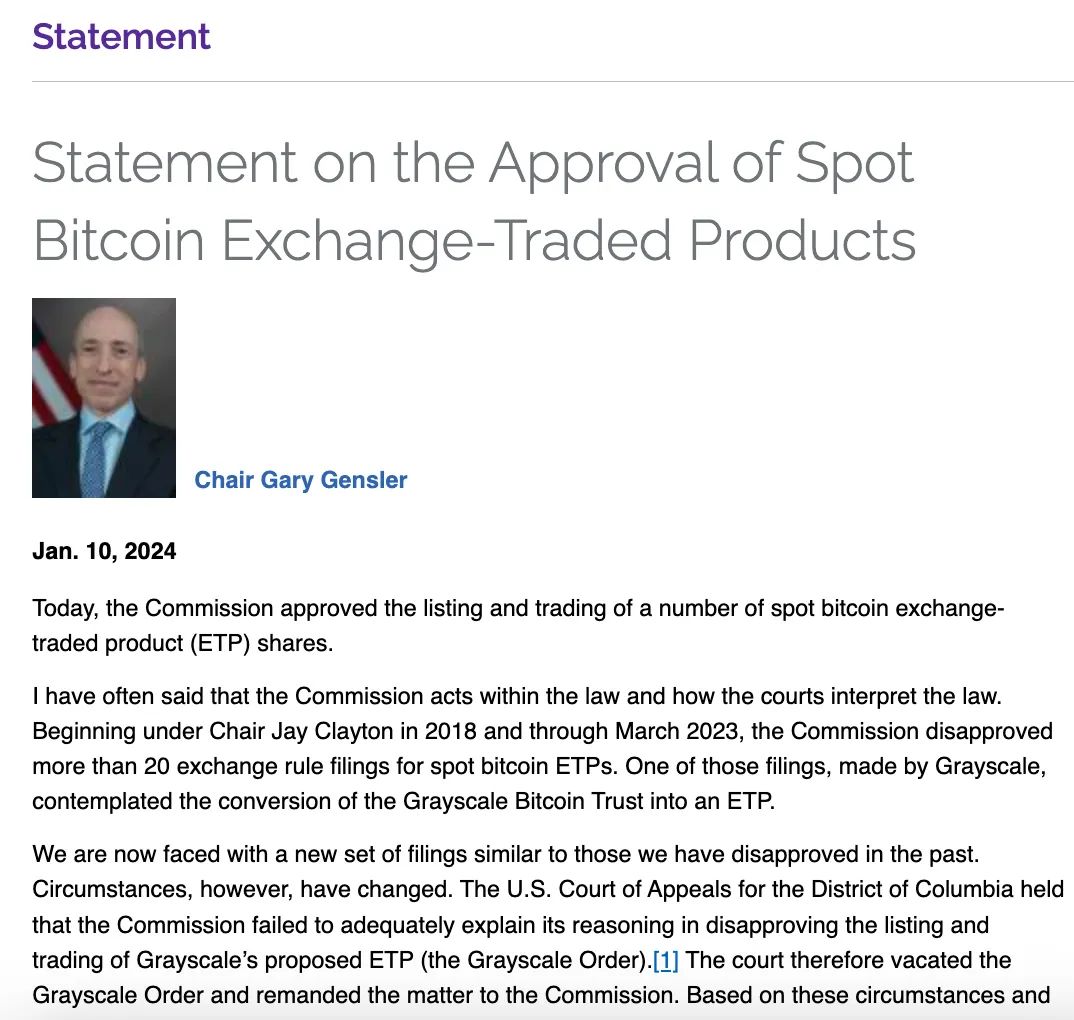Historic Moment: U.S. SEC Approves 11 Bitcoin Spot ETFs
Author: Qin Jin, Carbon Chain Value
Bitcoin has finally reached a historic moment!
On January 11, Beijing time, Gary Gensler, Chairman of the U.S. Securities and Exchange Commission, announced that the SEC has approved the first exchange-traded fund (ETF) in the U.S. that tracks Bitcoin.
On the 11th, the SEC announced that the 19b-4 filings submitted by the New York Stock Exchange, Nasdaq, and the Chicago Board Options Exchange have officially taken effect, allowing these markets to list Bitcoin spot ETF trading as early as the 12th. One day before the approval, the applicant institutions announced fees for investors and significantly reduced costs, indicating that a fierce battle for investor funds is about to begin.
Reuters described the SEC's approval of the Bitcoin ETF as "a significant watershed between crypto finance and traditional finance." This long-awaited move will give ordinary investors the opportunity to access Bitcoin.
Bloomberg's senior ETF analyst Eric Balchunas stated that BlackRock may inject $2 billion in assets on the first day of spot Bitcoin ETF trading, breaking the first-day flow record. Seed funding could provide momentum for BlackRock in the competition among 11 ETFs. Eric Balchunas believes that all these ETFs could raise up to $4 billion on their first trading day and $50 billion within two years.
According to a notice on the SEC's official website, the SEC approved applications from 11 companies, including BlackRock (BLK.N), Ark Investments, 21Shares (ABTC.S), Fidelity, Invesco (IVZ.N), and VanEck. Some products are expected to start trading as early as Thursday.
"It is important to note that the Commission's action today is limited to ETPs holding Bitcoin, a non-security commodity. This does not indicate that the Commission is willing to approve listing standards for crypto asset securities," Gensler stated in a statement on Wednesday. "This approval also does not reflect the Commission's views on the status of other crypto assets under federal securities laws or the current situation of certain crypto asset market participants not complying with federal securities laws."
In June of this year, asset management giant BlackRock submitted its application, leading its competitors to follow suit. Ark Invest and 21Shares had the longest application timelines, and the SEC's deadline for the fund in January led many industry experts to expect that the first Bitcoin ETFs would be approved shortly after the start of 2024.
Currently, more than ten different institutions are formally preparing to launch Bitcoin exchange-traded funds, with competition expected to include different fee rates and extensive marketing efforts. Several companies have already reduced the fees initially proposed.
There is no guarantee that all applications will lead to funds entering the market. The Cboe website stated on Wednesday afternoon that several Bitcoin ETFs would begin trading on its BZX exchange on Thursday.
SEC Commissioner Hester Peirce stated that the logic behind the agency's previous rejection of Bitcoin spot ETF applications is "puzzling." "While this is a moment for reflection, it is also a moment for celebration. I am not celebrating Bitcoin or Bitcoin-related products; the agency's view on Bitcoin is irrelevant. I celebrate that American investors have the right to express their views on Bitcoin by buying and selling spot Bitcoin ETPs."
However, SEC Commissioner Caroline Crenshaw expressed her disagreement with the approval order, stating that "a significant amount of evidence suggests" that the Bitcoin spot market is not safe and cannot avoid fraud or manipulation. She said that spot and futures products are not the same, and she disagrees with the court's ruling in 2023.
She stated, "Today, we rely on a fragmented, unregulated spot market and a futures market that the SEC itself does not regulate. As I pointed out, we rely on the idea, or hope, that whenever fraud and manipulation occur in the underlying spot market, it will somehow be reflected in the monitoring of the futures market. I do not believe that this transparency will exist."
Milestone for Bitcoin
According to Reuters, these products have been in the making for ten years, changing the game for Bitcoin, allowing institutional and retail investors to access the world's largest cryptocurrency—Bitcoin—without holding it directly, and providing significant momentum to the crypto industry, which has been plagued by a series of scandals.
Analysts at Standard Chartered Bank stated this week that the ETF could attract $50 billion to $100 billion in funds this year, potentially driving Bitcoin prices up to $100,000. Other analysts indicated that inflows could approach $55 billion within five years.
Andrew Bond, Managing Director and Senior FinTech Analyst at Rosenblatt Securities, stated, "This is a huge positive factor for the institutionalization of Bitcoin as an asset class." The approval of the ETF will further legitimize Bitcoin.
In response to this news, Bitcoin rose 1% to $46,515. Some analysts pointed out that the market may have already priced in the approval news—Bitcoin has surged over 70% in recent months due to increasing expectations for the ETF, reaching its highest level since March 2022 earlier this week.
The approval marks a significant shift in the SEC's stance, which has rejected Bitcoin ETFs for a decade due to concerns that they could be easily manipulated. SEC Chairman Gensler is also a cryptocurrency skeptic.
Last year, after a federal appeals court ruled that the agency's rejection of Grayscale Investments' application to convert its existing Grayscale Bitcoin Trust (GBTC) into an ETF was erroneous, the SEC's hopes for Bitcoin ETF approval surged. This ruling forced the agency to reevaluate its position.
Gensler stated in a statement that approving these products is "the most sustainable way forward" based on the court's ruling, but he added that the agency does not endorse Bitcoin due to its risks and volatility.
Grayscale CEO Michael Sonnenshein stated, "Like many future investors in Grayscale, we believe Bitcoin can change the world, and we are excited about the prospect of democratizing this asset through U.S. regulated investment tools."
Some products will be listed on the New York Stock Exchange, and Douglas Yones, head of exchange-traded products, stated that this approval is also an important "milestone" for the ETF industry.
ETF Trading Fees
ETF trading fees have become a focus for potential investors. Before the approval, various applicant institutions repeatedly updated their S-1 filings to change ETF trading fees in an effort to stand out in the competitive Bitcoin spot ETF race. It was only at the last moment that the 11 applicant institutions finalized their trading fees. According to data released by Bloomberg ETF analysts:

BlackRock iShares fees are 0.12% for the first 12 months, increasing to 0.25% after 12 months or AUM reaches $5 billion. Bitwise fees are 0 for the first 6 months, increasing to 0.2% after 6 months or AUM reaches $1 billion. Ark/21Shares fees are 0 for the first 6 months, increasing to 0.21% after 6 months or AUM reaches $1 billion. Fidelity fees are 0 until July 31, 2024, then 0.25%;
Wisdomtree fees are 0 for the first 6 months, increasing to 0.3% after 6 months or AUM reaches $1 billion. Invesco Galaxy fees are 0 for the first 6 months, increasing to 0.39% after 6 months or AUM reaches $5 billion. Valkyrie fees are 0 for the first 3 months, increasing to 0.49% after 3 months. VanEck's fees are 0.25%. Franklin Templeton's fees are 0.29%. Hashdex's fees are 0.9%. Grayscale's fees are 1.5%.
Among the 11 institutions that disclosed trading fees, the world's largest asset management company, BlackRock iShares, has fees of 0.12% for the first 12 months, increasing to 0.25% after 12 months or AUM reaches $5 billion. Given its prominence, performance record, and hundreds of successful funds, this investment giant is likely to become one of the favored leaders.
While many factors determine the popularity and trading volume of an ETF after listing, in this case, all ETFs will hold the same asset—Bitcoin—so details like fees become key differentiators.
Bloomberg Intelligence ETF analyst James Seyffart stated in an interview, "Fees will be crucial." I don't think issuers need to offer absolutely the lowest fees, but I do believe they cannot charge excessively high fees and must remain competitive.
These fees are used to cover costs such as custody services, marketing, and even salaries. According to research by Morningstar, the average fee for open-end mutual funds and exchange-traded funds in 2022 was 0.37%, significantly lower than 0.91% two decades ago.
Invesco and Galaxy brought a "big surprise," as described by ETF analyst Eric Balchunas, stating they would completely waive fees for the first six months and when AUM reaches $5 billion. After that, for the next six months or when AUM reaches $5 billion, they will increase to a fee of 0.39%.
Nate Geraci wrote on social media platform X: "From a purely competitive standpoint, fee rates are very important in this particular category," Geraci is the president of investment consulting firm The ETF Store, which has been producing podcasts about exchange-traded funds since 2011.
Full Statement from the SEC on Approving Bitcoin Spot ETFs

Today, the Commission approved the listing and trading of certain spot Bitcoin exchange-traded products (ETPs).
I often say that the Commission acts within the bounds of the law and the courts' interpretation of the law. From the time of Chairman Jay Clayton in 2018 until March 2023, the Commission rejected more than 20 spot Bitcoin ETP trading rule filings. One of the applications was submitted by Grayscale, which considered converting the Grayscale Bitcoin Trust into an ETP.
We now face a series of new applications similar to those we previously did not approve. However, circumstances have changed. The U.S. Court of Appeals for the District of Columbia found that the Commission failed to adequately explain its reasons for not approving Grayscale's proposed ETP listing and trading (Grayscale Order). Based on these circumstances and those discussed more fully in the approval order, I believe the most sustainable way forward is to approve the listing and trading of these spot Bitcoin ETP shares.
The basis on which the Commission evaluates any rules submitted by national securities exchanges is whether the rule is consistent with the Exchange Act and related regulations, including whether it is designed to protect investors and the public interest. The Commission remains neutral and does not express opinions on specific companies, investments, or the underlying assets of ETPs. If a securities issuer and a listing exchange comply with the Securities Act, the Exchange Act, and the Commission's regulations, then that issuer must have the same opportunity to enter our regulated markets as anyone else.
Importantly, the Commission's action today is limited to ETPs holding a non-security commodity—Bitcoin. This does not indicate that the Commission is willing to approve listing standards for crypto asset securities. This approval also does not reflect the Commission's views on the status of other crypto assets under federal securities laws or the current situation of certain crypto asset market participants not complying with federal securities laws. As I have said in the past, without prejudging any particular crypto asset, the vast majority of crypto assets are investment contracts and therefore subject to federal securities laws.
Today, investors can buy, sell, or otherwise access Bitcoin through some brokerage firms, mutual funds, national securities exchanges, peer-to-peer payment applications, non-compliant cryptocurrency trading platforms, and of course, the Grayscale Bitcoin Trust. Today's action will include certain protections for investors:
First, the sponsors of Bitcoin ETPs will be required to provide comprehensive, fair, and truthful disclosures about the products. Any investor in a listed Bitcoin ETP will benefit from disclosures in publicly registered statements and periodic documents. While these disclosures are required, it is important to note that today's action does not endorse the disclosed ETP arrangements, such as custody arrangements.
Second, these products will be listed and traded on registered national securities exchanges. These regulated exchanges must establish rules designed to prevent fraud and manipulation, and we will closely monitor these exchanges to ensure they enforce these rules. Additionally, the Commission will conduct a thorough investigation of any fraud or manipulation in the securities markets, including schemes implemented using social media platforms. These regulated exchanges also have rules aimed at addressing certain conflicts of interest and protecting investors and the public interest.
Furthermore, existing rules and standards of conduct will apply to the buying and selling of approved ETPs. For example, this includes the best interest rule for broker-dealers recommending ETPs to retail investors, as well as the fiduciary duty of investment advisers as stipulated in the Investment Advisers Act. Today's action does not approve or endorse cryptocurrency trading platforms or intermediaries, as they often do not comply with federal securities laws and frequently have conflicts of interest.
Third, the Commission staff is simultaneously completing reviews of the registration statements for 10 spot Bitcoin ETPs, which will help create a fair competitive environment for issuers, promoting fairness and competition to benefit investors and the broader market.
Since 2004, the agency has accumulated extensive experience in overseeing spot non-security commodity ETPs (such as commodity ETPs holding certain precious metals). This experience is valuable for our oversight of spot Bitcoin ETP trading.
While we maintain a neutral stance on their merits, I want to point out that the underlying assets of metal ETPs have consumption and industrial uses, whereas Bitcoin, in contrast, is primarily a speculative, volatile asset that is also used for illegal activities, including ransomware, money laundering, evading sanctions, and financing terrorism.
While we have approved the listing and trading of certain spot Bitcoin ETP shares today, we have not approved or endorsed Bitcoin. Investors should remain cautious about the various risks associated with Bitcoin and products linked to its value.
What is the Cash Redemption Model?
In recent weeks, the SEC has notified potential suppliers of Bitcoin spot ETFs that the creation and redemption process will be based on "pure cash" rather than "physical." Will this have a substantial impact on the effectiveness of the products? BitMEX Research believes this may somewhat affect the attractiveness and effectiveness of the products. This does not mean that these ETFs will fail, but it does suggest that these products may not be as robust.
BitMEX Research stated that they analyzed a database of over 10,180 ETF products globally and attempted to determine the creation and redemption processes in each case. In terms of product quantity, cash products are relatively common, accounting for 21.7%. This represents 2,208 ETFs. To our knowledge, many of these products only charge cash at the issuer's discretion, rather than at the request of regulators. When the data is broken down by assets, products that are purely cash are much fewer, accounting for only 7.4%. In an $11.6 trillion industry, this amounts to $862 billion in assets.
We also examined the tracking error of ETFs, which is one of the metrics for measuring product effectiveness. Tracking error is an indicator of how closely an ETF tracks its benchmark, which, for Bitcoin ETFs, is the Bitcoin price index derived from spot trading activity. Data shows that cash ETFs often have smaller tracking errors compared to products that allow for physical creation.
How Do ETFs Work?
If an ETF trades at a premium (usually due to more buyers than sellers), authorized participants (APs) have the incentive to buy the underlying instruments and deliver them to the issuer in exchange for new ETF units. Then, due to the ETF trading at a premium, the authorized participants can sell the new ETF units in the market for a profit.
If the ETF trades at a discount, the situation is reversed. APs buy ETF units in the market, provide them to the issuer, and then receive the underlying assets. They then sell the underlying assets for a profit because the product is trading at a discount.
Most importantly, there should be multiple competing APs. This ensures that the product can handle large flows of funds and has lower tracking errors.
If only cash creation and redemption are allowed, many of the advantages of the ETF structure will be lost. Now, only the issuer can buy and sell Bitcoin in the market. Many of the competitive dynamics that make the ETF effective will no longer exist.












